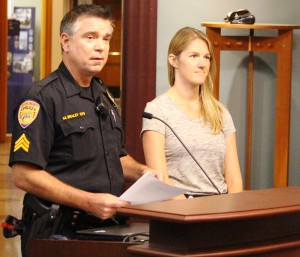Over the past couple months I have been researching thePolice Assisted Addiction Recovery Initiative (PAARI) program as a possible tool for the Everett Police Department to use in helping people with addiction issues who are trying to change their lifestyle. PAARI is a nonprofit that helps connect police departments with a network of treatment centers around the country that can provide scholarships and fully-funded in-patient programs for addicts. Just a few weeks ago, we had the opportunity to see what a difference this program could make in Everett.
On Wednesday, Nov. 11, Everett Police Officer Jack Jessup encountered Amy*, a 20-year-old female, near the Everett Gospel Mission. Amy shared with Officer Jessup that she is a meth addict and wanted help getting off drugs and the streets. She has been homeless in Everett off and on for seven years after running away from home when she was 13. Amy also has a history with heroin, and recently signed over parental custody of her 2-year-old son to her mother. Officer Jessup contacted me from the field and together we arranged for Amy to come to the police station to meet. She arrived later that afternoon and after a short conversation, it was clear to me that Amy was ready for change and was highly motivated to rebuild a relationship with her son.
After meeting Amy, I felt that she would really benefit from a long-term inpatient treatment program, such as the ones that are part of the PAARI network. I contacted PAARI representatives, explained the circumstances, and requested help in placing Amy in a treatment program. Within four hours, they confirmed that Amy would be welcomed at a recovery center in Palm Springs, CA for a 3-month program, on a scholarship and at no cost to her or the City of Everett. That day, I contacted a detox facility in Tukwilla and secured a 5-day detox for Amy, and two of our officers transported her there.
On Friday, Nov. 13, we reached out to the Volunteers of America to share Amy’s story and request financial assistance for Amy’s plane ticket to Palm Springs, which came to about $450. The VOA agreed to contribute the full amount needed for the plane ticket. I went to the Everett Gospel Mission to gather some donated clothing for Amy to take to treatment, as well as some hygiene items.
On Monday, Nov. 16, Officer Jessup, Officer Mike Bernardi, and I drove to Tukwilla to transport Amy to the airport. We were able to coordinate with the Seatac Police Department ahead of time and arrange for parking access at passenger drop off. We bought Amy a pizza for lunch and sent her off prepared for the challenge of conquering her addiction. She had a great attitude and was hopeful about this opportunity. She began crying as she hugged and thanked me before boarding her plane.
I have spoken with Amy and clinical staff often since she arrived in Palm Springs. She is doing well and adjusting to the environment, and I’ve heard that the other residents have “taken her under their wing.” I am working to secure some financial means of sending Amy a Target gift card so that she can buy some necessities for herself while she is there. I will continue to support Amy and the center’s clinical team throughout the course of her stay there.
While EPD has not yet officially partnered with PAARI, we are all encouraged by what possibilities this program may offer the community of Everett, especially after this recent success. We know that a major challenge will be the current lack of sufficient detox beds here in Snohomish County and across the state. Before an individual can be placed with one of PAARI’s treatment center partners, it is desired that he or she complete a medical detox program, which typically takes about a week. Right now, we often turn to detox centers in King County because of the lack of beds available in our area. We are working with our community partners to find ways to close the detox-bed gap as we continue to explore PAARI. We are optimistic and excited about the positive impact this innovative program could have in our community.
*Name has been changed
Learn more about the social worker program. Please note that the intent of the embedded social worker program is not to circumvent established social service programs, but to assist officers in providing assistance to frequent utilizers and the chronically homeless beyond the traditional role of law enforcement. If you, or someone you know, are in need of services, please contact 2-1-1 for assistance or visit their website. 2-1-1 is an easy-to-remember phone number that quickly connects people with resources in their community.





December 7, 2015
Everett, Everett Government